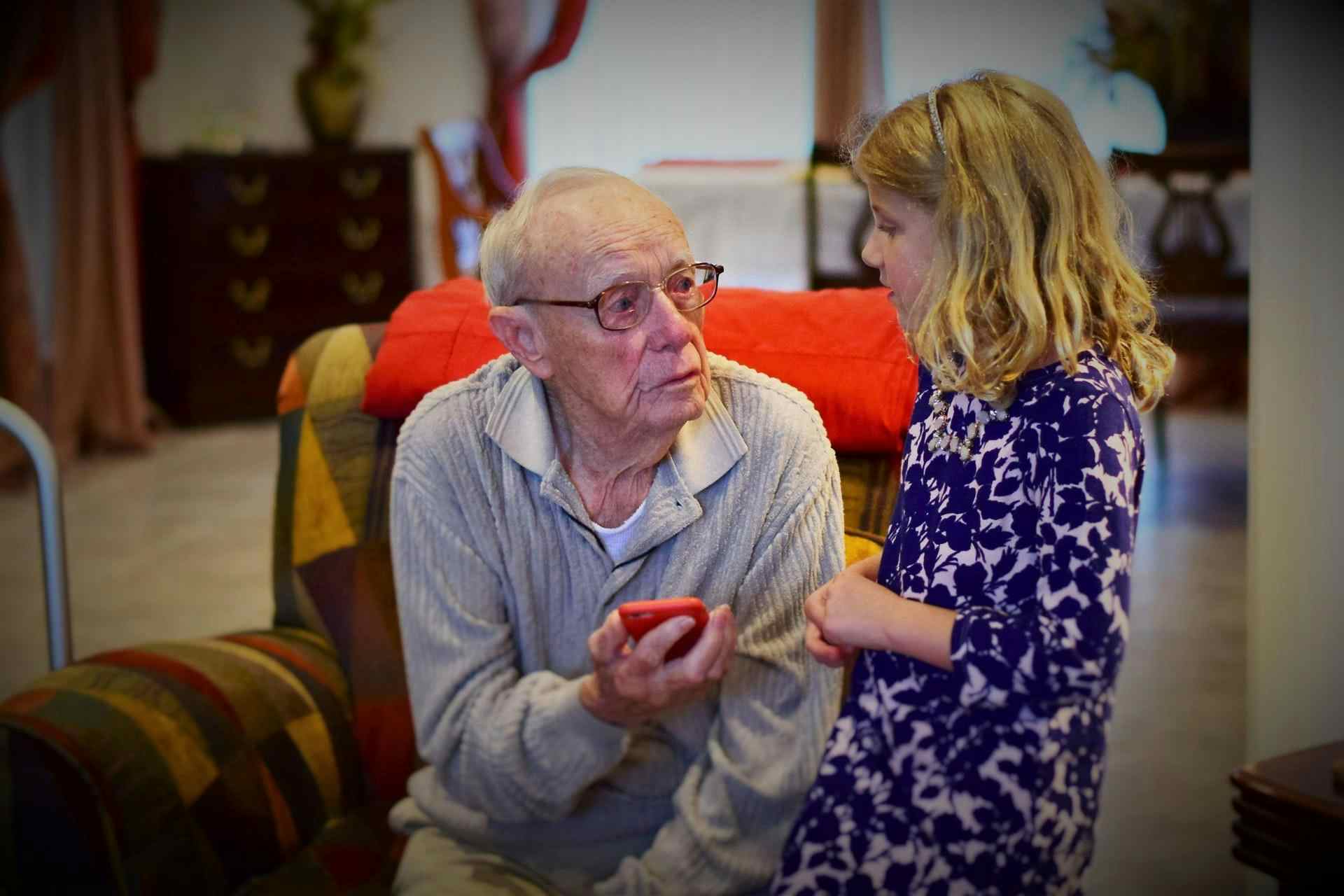Grandchildren can be a great addition to your life and bring incredible joy. But your grandchildren may lead very different lives from you, and their personalities can be challenging. What's more, your relationship with their parents can prove trying. Thankfully, there are many tips for creating great relationships with your grandchildren and their parents - even if said relationships are already good!
Let their parents be their parents
It's easy to do backseat driving because we don't have to drive the car and watch the GPS. Not having your hands full can allow you a perspective that the driver does not have. But, on the other hand, you don't have the driver's view and, ultimately, it's the driver's car, and they decide how they drive and where they're going.
When it comes to being a grandparent, your advice can prove invaluable in that you have a perspective the parents don't have. You're watching your grandchildren and the family from a distance. However, you still need to understand that it's not up to you to raise your grandchildren nor dictate in any other way how the family lives.
We are all different from one another. Accept that your children will go about parenting and how they live their lives differently from how you would. Advice them when suitable, but don't try to take over and dictate how they live their lives. Chances are, they'll only distance themselves from you if you do.
Your adult child is their own person. You are not there to provide caregiving to them like you did when they were children. Instead, you're there as a friend, mentor, and someone looking to spend time with their grandkids.
The Positive Parent Coach, Olivia Edwards, told us: "It can be difficult when parents choose to parent their children in a different way to how they were parented as grandparents can find this confusing and sometimes take it personally and can become defensive.
"It’s really more about gaining an understanding of what’s best for the child, using the knowledge we now know based on the current research and supporting each other to be consistent. As they say it does take a village to raise a child and for lots of people grandparents want to be part of the village but perhaps don’t know how."
Ask what the parents want
If the parents ask you to provide childcare, ask them what they expect. Ask about their routines, diet, and what games they enjoy playing.
By showing you care about the parents' opinion, you'll create a much better relationship with them. While there are decisions you can make on your own, you mustn't step on their toes when it comes to the big stuff.
If your grandchildren sense you have a good relationship with their parents, they'll be more willing to open up to you. On the other hand, if there's always conflict, they'll likely feel stuck in the middle and fear taking sides.
Should the parents do something that harms your grandchildren, on the other hand, then you have to stand up for what's right. That, however, is very different from nitpicking or simply believing your way of raising children is better than theirs.
Be a positive force
When you give advice or come for a visit, be positive. Compliment the parents and the grandchildren whenever you can. For example, if your grandchildren aren't great with homework, encourage the little they do rather than coming down on them about it. Find ways to make them do more homework without them feeling criticised.
When looking at a home from a distance, we often see the good and bad in a way those who live there don't. While they're working, paying bills, cooking, cleaning, attending parenting meetings, and attempting to have a social life, they don't always pay attention to everything. Nor do they necessarily know how to deal with their problems. It's easy to criticise the pile of dirty dishes, the way the parents are snapping at each other or the children, or how the children are behaving. But, we don't see the underlying causes for those things, be it fatigue or interpersonal relationships.
When you step into your children and grandchildren's home, see it as their holy sphere. Treat it with respect. And whatever good you see, compliment it. That way, if you have to point out something that doesn't seem to be working, they'll be more willing to listen. They know you are there to raise them up, not bring them down.
Genuinely find out about who they are
It's easy to huff and puff when we don't understand someone's personality or interests. Why is one grandchild so prone to lashing out and the other lost in a video game all day? To be able to build a connection, we can't just focus on what we like in someone. We also need to aim to understand the things we aren't so keen on.
Instead of telling your grandchildren that they should be more like their grandfather or grandmother, listen to them. If one of them has difficulties with anger, read up about it. If one of them loves video games, learn about the games. Learn about what they love about the game. If you want them to spend more time in the "real world," find ways to make the game come alive. Draw parallels to real life. Or find apps that help them engage more in the real world. An app that involves solving a mystery at a museum could, for example, lead to a visit to a real-world museum.
Also, when you learn about something, you can provide better feedback. For example, most parents and grandparents aren't thrilled about how their children and grandchildren use TikTok. If you tell them straight out that TikTok is bad for them because you read something about it, chances are they won't listen.
On the other hand, if you join TikTok and find some videos on there you enjoy, you can talk to your grandchild about them. Then they might share some videos they enjoy. You can now tell them what you like and don't like about those videos. Try to formulate it as questions as opposed to judgements, too. For example, you could ask: "Do you think this video helps you become a better person?" Or: "What videos could you watch that would improve your confidence?"
You may also end up surprised - maybe what your grandchild enjoys isn't as uninteresting or bad for them as you first thought. Get curious.
Learn to listen
Your grandparent-grandchild relationship can only get better with active listening. When your grandchildren speak, take the time to listen. Don't judge what they're saying, and don't give them your opinions. Don't think about what to say next. Just sit back and listen. Ask clarifying questions. You can do the same with your adult children. You might be surprised by what you learn.
As an older person, you are a mentor, a person of influence in their lives. But that doesn't mean you always have to give an opinion. Sometimes just being there to listen is what your grandchild needs. After all, every child wants to be heard.
We spoke to Fiona Ng from Happy Me Parenting, who told Age Times: "Many of us remember our grandparents fondly for their storytelling and sitting with them as children listening to their stories but kids also want to feel seen and heard!
"For grandparents, it’s a great opportunity to heal some of the areas that perhaps went amiss with their own kids and they can create time and space to really be present and to notice their grandkids. To ask open-ended questions, to find out their likes/interests - to even keep a notepad where they write down all the important things their grandkids mention so they can keep up to date with friendship circles and favourite games or what they are learning at school.
"The main goal being to really see and hear the child and make them feel like a really valued and respected part of the family."
Love them how they want to be loved
I often mention the five love languages in my articles, and there's a reason for that. Different people need different things to feel loved and appreciated. For example, at work, an employee may feel appreciated when being given more responsibility, just as a grandchild might feel proud the first time grandma allows her to bake her own cookies. However, most people respond to five main "love languages" in everyday life. Those are:
- Words of Affirmation, like being told they are loved or receiving compliments
- Physical Touches, like hugs or a pat on the back
- Acts of Service, like doing the laundry or helping to mow the grass
- Quality Time together where you are both attentive to one another
- Gifts, which could be as simple as a flower picked up from the roadside or as elaborate as a custom made necklace
These different ways of expressing love aren't just important when fostering your grandparent-grandchild relationship but also when fostering the relationship you have with your adult children.
Learn to connect in different ways
The role of grandparents varies. Some grandparents act as full-time carers for their grandchildren, others as part-time carers. Yet others see their grandchildren twice a year or even less. However, no matter how often or rarely you see your grandchildren, you can find different ways of interacting with them. Every child is different and, therefore, enjoys connecting in different ways.
Here are some ideas for how to connect with your grandchild:
- Face-to-face in the home
- Face-to-face while out doing activities
- Social media
- Video chats
- Traditional phone calls
- Letters - the kind that arrive in the post!
- Emails
- Playing online games or using the same apps
With letters and emails, or even instant messages, you can work on word lists or a word of the day. You can write stories or ask each other how you are doing. This can also help your grandchild learn new words and how to express themselves through the written word.
When doing video calls, you can play the kind of games you can play when not next to each other, like chess, do some arts and crafts, read a book, or just chat.
You can also do group chats with all your grandchildren or various family members or even get into regular group video calls.
Apps can prove fun, too - whether you're challenging each other to learn a new language on Duolingo or competing against each other while playing a game.
If you're meeting face to face, look for activities your grandchild enjoys that are also educational on top of being great fun. Possible activities could range from cooking and gardening to building a kite or going for a hike while learning about nature. Tristan Gooley has written some excellent books about learning how to read nature. There are also plenty of books on Amazon about outdoor activities for children.
There are lots of activities you can do with children indoors, too. Use Google to search for ideas for arts and crafts, games to play with children, and simple science experiments. Your local library probably has a treasure trove of books about activities for children, too. Try to find things you know you'll also enjoy. Trying to build a doll's house when you swear every time you use a hammer may not be that much fun!
When you're too tired to entertain your grandchildren, take them out for activities where you get to sit down and have a coffee. Local parks and coffee shops, as well as libraries and museums, often have supervised activities for children.
Alternatively, you could offer to take your grandchildren to their activities or sign them up for new ones. Be that practising magic or learning how to play football.
Stand up for what's right
Let the parents know if you find trouble in paradise; for example, if one of your grandchildren has problems their parents aren't acknowledging or something is wrong. These are the kind of things where it's no longer an opinion but where there's hard evidence something needs to happen. For example, you might prefer your grandchildren to be vegetarians, and their parents want them to eat the Paleo diet. But, of course, those are differing opinions. So you need to let the parents do what they think is best. In contrast, if the parents only give the children crackers and milk for dinner, and breakfast and lunch aren't much better, you need to say something.
And while you want to be liked by your grandchildren, helping them lie to their parents about where they went last weekend likely isn't going to help anyone in the long run.
If there's some conflict you don't know how to address, read up about ways to handle conflict before addressing the issue. Telling a parent that their child needs evaluating for autism or that their partner is abusive can be very difficult. But by the end of the day, when it comes to "the big stuff," you have to do what's right, not what's easy.







